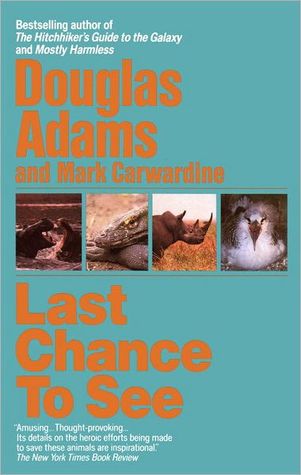More on this book
Community
Kindle Notes & Highlights
He was tall, dark, and laconic and had a slight nervous tic. He explained that he used to be just tall, dark, and laconic, but that the events of the last few days had rather got to him. At least he tried to explain this. He had lost his voice, he croaked, due to a lot of recent shouting.
I laughed, a little hectically, I admit, and said that it was probably just as well.
We had been told by someone on the plane that there were only three trucks on the whole of the island of Flores, and we passed six of them on the way in. Virtually everything we were told in Indonesia turned out not to be true, sometimes almost immediately. The only exception to this was when we were told that something would happen immediately, in which case it turned out not to be true over an extended period of time.
American couple who were merely very interested in mission work, and wore straw hats from Miami, cameras, and vacantly benign expressions which they bestowed on everyone indiscriminately, whether they wanted them or not.
For much of the time we were tramping through wet fields of sago, and a foolish but happy thought suddenly occurred to me. We were walking through the only known anagram of my name—which is Sago Mud Salad. I
Mark was getting red and sullen.
You can’t help but try and follow an animal’s thought processes, and you can’t help, when faced with an animal like a three-ton rhinoceros with nasal passages bigger than its brain, but fail.
IF YOU TOOK THE WHOLE of Norway, scrunched it up a bit, shook out all the moose and reindeer, hurled it ten thousand miles around the world, and filled it with birds, then you’d be wasting your time, because it looks very much as if someone has already done it. Fiordland, a vast tract of mountainous terrain that occupies the southwest corner of South Island, New Zealand, is one of the most astounding pieces of land anywhere on God’s earth, and one’s first impulse, standing on a clifftop surveying it all, is simply to burst into spontaneous applause.
On the other hand, human beings, who are almost unique in having the ability to learn from the experience of others, are also remarkable for their apparent disinclination to do so.
One conservation worker we met said he sometimes wondered if the mating call of the male didn’t actively repel the female, which is the sort of biological absurdity you otherwise find only in discotheques.
New Zealand niceness is not merely disarming, it’s decapitating as well, and I had come to feel that if just one more person was pleasant and genial at me, I’d hit him.
We followed a path for a while, which allowed us for the moment to keep up with Arab, while he told us a little about other dogs that he had trained to be hunting dogs, for use in clearing islands of predators. There was one dog he was particularly fond of, which was their top hunting dog, a ferocious killer of an animal. They had taken the dog all the way to Round Island, near Mauritius, with them a few years ago to help with a big rabbit-clearance program. Unfortunately, once it got there, it turned out to be terrified of rabbits and had to be taken home.
I’ve never understood all this fuss people make about the dawn. I’ve seen a few and they’re never as good as the photographs, which have the additional advantage of being things you can look at when you’re in the right frame of mind, which is usually about lunchtime.
“Have you gone completely mad?” Mark asked me as I slipped a sixth different bottle into my hand baggage. “I’m trying to challenge and subvert my own fundamental assumptions as to what constitutes rationally constructed behaviour.” “Does that mean yes?”
When you spend much time on islands with naturalists, you will tend to hear two words in particular an awful lot: endemic and exotic. Three, if you count disaster.
Island ecologies are fragile time capsules.


